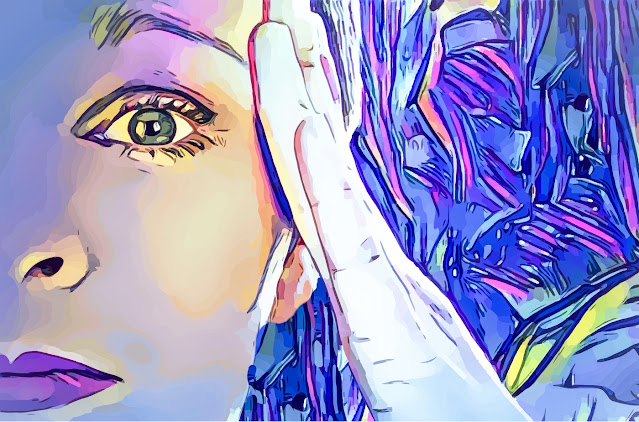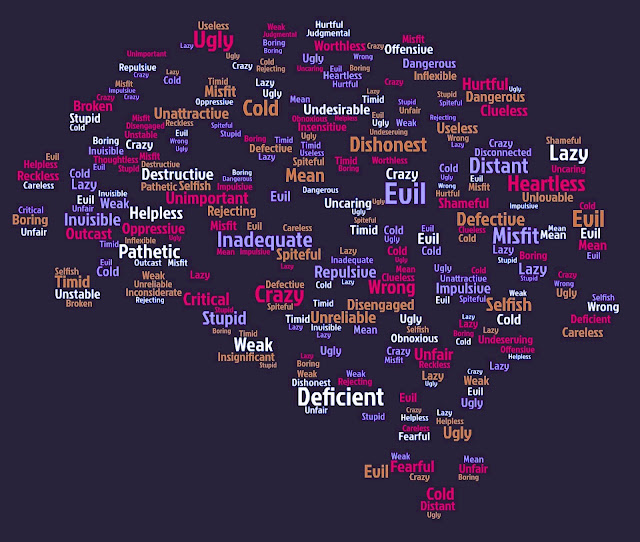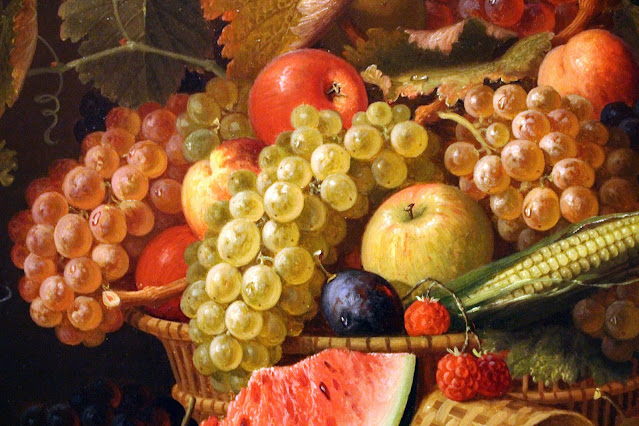It’s unspoken, but ever present behind one’s mind.
That which you don’t know, lurks behind you, begging for full understanding.
Thoughts and emotions are fleeting in every direction, with no certain path to be followed.
Anything dreaded, could conquer everything that you are.
The only exit that exists is the one you artistically create.
There is nothing to face, once you are on your way.
Any fears that remains are all, but in dismay.
Leave behind the shadows from the past.
The Elements of Self-denial
When starting a new artistic activity or endeavor, a person will occasionally face various situations that need to be addressed first, before any real progress begins.
These situations are not usually the subject at hand, but the individual himself.
A subject or activity is just exactly that. It exists as it is.
Such things only come alive when one brings them alive by creating motion in that direction. If there is no creation in that direction, it simply means that the subject or activity is not alive in relation to self.
Thus, a person’s state of mind or attitude towards those areas will determine how successful or not he or she will become down the road.
In the inner workings of the mind, there could be some negative elements that might be hindering the person, from progressing in that desired activity.
Then, it becomes crucial that one finds, understands and resolves the reasons why one is refusing or rejecting oneself from doing these activities.
It comes down to self-denial.
This can be a dreadful experience for some, where an individual wants to do something, but can’t get started or find a way to do so, due to self-denial.
These are 3 reasons why someone might experience self-denial:
1. Past negative experiences.
2. Distractions from the environment.
Past Negative Experiences
Negative situations can leave a person with mental scars that can’t be healed overnight. These scars can daunt one’s thoughts to the point of not being able to operate as one pleases.
Getting started can become harder to do with fear and uncertainties lurking all around one’s thoughts, caused by past negative experiences which are clinging to one at the present moment.
As a result, a person could find himself or herself getting involved in less activities or none at all.
These single negative past-experiences might not be much by themselves, but their accumulation can get overwhelming and start weakening your willpower towards your artistic goals.
Also, past failures are part of this overall situation of self-denial. These kinds of experiences, can spill over onto other areas of a person’s life.
If they do in some way, a person could start placing these concepts of failure in a desired new activity, way before they had any real chance to get started or get grooved in.
Failures are just smaller steps towards success, but one has to:
1. Learn from any experience, good or bad, in order to grow from it.
2. Avoid making the same mistakes or errors twice.
Such past failures could make a person feel fearful in trying new activities in the arts, even though he has the ability or potential to do so. It reminds him or her of those undesirable moments.
Therefore, those past negative thoughts aren’t natively yours.
Distractions from the Environment
As an individual, there might be a chance that you had experienced the situation where you had a list of things you intended to do for the day, but other things came up instead.
Somehow, life keeps tossing other things your way every time you tried to get anything done.
Then, next thing you know, the day flies by, and you find yourself feeling disappointed because only a few things got done or nothing at all sometimes.
Such a situation, if it continues, life could begin to feel sort of hopeless towards your artistic and personal goals. You might feel as if there’s no time for your artistic work, so self-denial starts settling in.
Sometimes, the things that come up are legit situations that need to be addressed, so you can care for those you love, yourself, or helping those in need of help.
Of course, helping others is the highest virtue a person or group could experience per societal standards because life is all about helping.
But, an artist has to find a healthy balance in how he or she is going to allocate and spend their time. Some things that come up are fine, so they'll need to be done now or scheduled for later. Or they could be outright distractions from what you should be doing per your priorities.
Well, distractions could be good or bad, but it’s a matter of perspective. They can be inspirational or uplifting or totally unnecessary sometimes based on what they are.
So, determining how you’re going to use your time, as an artist, is crucial.
Current Pressing Situations
There are times, where life happens in ways that it's unexpected, unwelcome, and undesired inside an artist’s world.
It could be related to a personal situation, family, or the workplace or some other problem that’s on your plate. This might require much of your physical and mental time to work out how to solve it.
If a situation is pressing and consuming much of artist mental energy, it might have a negative influence upon their thoughts and creativity.
But, an artist, in order to stay uplifted, motivated and productive, regardless of any situation, he or she might need to figure out how to gain more spare time for creating your work.
In actual fact, while considering all of the above, deep down one is always intending to do much in life based on one’s purposes.
But sometimes, an artist could get pushed down by life to a point, where personal desires or goals might feel less important because of it.
Too Technical Beyond Believe
A common fear amongst beginners is the idea that some fields in the arts might be too technical for their comprehension, so failure is the assumed outcome if they try to get involved.
Such a new undertaking might have many specialized elements that could make a newcomer feel uncomfortable. They started out from a personal curiosity or interest on the subject, but it didn’t turn out as simple as they thought.
There is a possibility that the person had aspirations, but after a closer look into the subject, certain things appeared to be as hieroglyphs or sounded as a foreign tongue.
At which point, they felt that the subject or activity is too complicated to envision himself or herself succeeding in it. Thus, disabusing themselves of their original ambition.
If a beginner is getting his or her feet wet in the arts and making some progress, it’s vital that any confusion that may arise from the activity gets clarified and understood right away. By doing so, it'll help maintain a higher level of interest in the subject because any confusions that were there, are gone. Thus, leaving your thoughts and understanding free of confusions.
A single confusing aspect or a buildup of them, it has the potential power to lessen your personal interests and creativity in the arts, if not clarified. It could have a detrimental effect upon one, unless it’s addressed.
5 Ways to Face Fears Behind Artistic Doors
The element of fear lies behind self-denial and the feeling that it’s beyond one’s understanding in the world of the arts.
Such fears can hinder one’s initial ambitions to start and achieving your goals.
#1. Grasping Basic Terminology of Your Artistic Niche
The element of not knowing can create much fear and anxiety to an individual or a group of people.
It sometimes happens at a conscious level. Where a person is aware of the unknown and starts feeling kind of anxious about it. The lack of understanding of basic terminology on a subject or activity could affect your part of your demeanor and ability to make good decisions to some degree.
But, it could also manifest itself at the unconscious level. This is where a person doesn't know what’s going on, except the feeling of flight is present.
Such sensation of fleeing doesn’t particularly always have to be a physical manifestation, moving away from something. Instead, it can happen mentally. This is where, one’s thoughts start drifting away from the area of interest. As a result, one ceases actions towards that subject or activity.
If an artist can’t understand something based on the above, he can’t go forward to that degree in that endeavor.
So, the more one knows with complete certainty, the more he or she can control the tools, activities, and surroundings of that subject.
The essential actions that needs to be done as an artist:
1. Make a list of all the common terms you don’t understand in that subject, whether they are technical or not.
2. Study each word from that list you made, until you fully get it. It might require you to sketch it out, read more about the subject or watch any videos on it, to help you gain a mental illustration of it.
3. Keep going until you feel great about the subject. You just want to have all the basic terms under your belt, so your thoughts are free. If you can freely think in the area, it can help increase creativity in that area.
#2. Tackling Every Step, One Step at the Time
Rushing sometimes leads nowhere.
An artist can be eager to learn how to do something, but if he or she rushes through the motions beyond his ability to control and understand it, it could lead to wasted time and failure.
It’s better to take your time and do it right in the first place, so you can become more certain and able with that skill. Than wrongly going through the motions because one is in a rush. Stay on that basic step until you fully got it. Then, move to the next one.
Sometimes, if a person starts a new field of art, it could feel quite overwhelming similar to staring straight up at a massive mountain, but the view and experience is always priceless once up there.
In order to climb the mountain, one doesn’t always have to look at the entire mountain towards its summit. It can be sometimes stressful for some people to do that. Because the mental idea of how much work and forward progress needs to be made for a person to climb the mountain, could make him or her want to stop right there and then.
It's similar to a beginner feeling the same way when conceiving and confronting a brand-new subject that might be technical. But instead, one could face just a small section of that mountain. Then, the next one, until one is on top of that mountain.
Well, the arts and a mountain are not the same thing, but a person can always mentally breakdown an activity down to sections, so it’s easier to face it, step by step, until one reaches one’s goal.
So, take it one step at the time, and you’ll make it. It’s a matter of perseverance.
#3. Endlessly Create Until the Skill Becomes Yours
If you are a painter, you paint.
Then, if you are a writer, you write.
If you are a singer, you sing.
That’s how you learn, by practicing, again and again.
If you recently started a new activity in the field of the arts, welcome.
An expert, in any specialized field, started out somewhere, and they persisted on that given course, until they got where they wanted to be. It required much practice.
The journey is the most rewarding point, especially if you have to reflect back on yourself from where you started to where you are now or will be.
Based on how often you practice, it determines how good and fast you become.
So, start and follow your goals. The most important step is STARTING.
#4. Find and Stay Connected with Other Artists
Stay connected and grow in your artistic field.
Group moral support can go a long way in helping you accomplish your goals.
#5. Learn Something New Every Day
Try to make it a personal goal, to always learn something new each day.
Artistic Evolution
Remember, you are the creator of new realities and experiences.
Fears shatter in the face of understanding.
Allow such wisdom to embrace that, which weakens you.
Thus, grow stronger and mightier than before.
Let your creativity help the world be a better place.
Read and use self-help books.
Nathaniel Bernard—Art Blogger
















Comments
Post a Comment